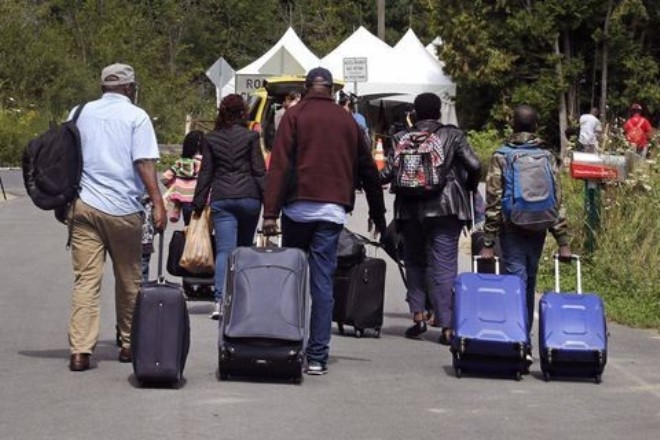
Saturday October 21, 2017

A family from Haiti approach a tent in Saint-Bernard- de-Lacolle, Que., stationed by RCMP to seek asylum in Canada in August.
Nearly 70 per cent of asylum claimants who entered Canada through unauthorized crossings and had their cases reviewed between March and September were granted refugee status, according to newly released government data, which are based on the small fraction of cases that have been processed.
More than 15,100 people have crossed into Canada at unofficial points of entry along the U.S. border since January, after U.S. President Donald Trump's anti-immigration measures.
According to new data from the Immigration and Refugee Board (IRB), 10,790 asylum claims were referred to the IRB between March and September. Of the 592 cases – or 5.4 per cent – the IRB processed during that period, 408 – or 69 per cent – were accepted as legitimate refugee claims. The statistics do not account for border crossers deemed inadmissible or ineligible to claim asylum, as their cases are rejected before they reach the IRB.
"People really prejudged a lot of these people. So many people saying, 'Oh they're bogus. They're just queue jumpers,'" Toronto-based immigration lawyer Chantal Desloges said. "The statistics are clearly belying that assumption."
However, the government is warning that the data should be taken with a grain of salt.
"The statistics released by the IRB are based on a small sample size – only 5 per cent of the total number of asylum claims within this particular cohort that have been referred to the IRB. As such, these early statistics should not be used to draw broader conclusions about asylum seekers who cross from the U.S.," Immigration Minister Ahmed Hussen's office said in an e-mail.
The data come after a recent Nanos poll for The Globe and Mail showed that Canadians were equally divided over whether the country should welcome asylum seekers from the United States or close its border to them.
The poll, conducted Aug. 30 to Sept. 1, found that more than one-third of Canadians – 37 per cent – say Canada should welcome asylum seekers from the United States, while the same percentage of respondents think Canada should close its borders; 26 per cent were unsure.
The IRB took the unusual step of publishing data on irregular border crossers on Tuesday – a move Ms. Desloges said might be strategic.
"I don't know what their motivation might have been, but I do know that there's a very strong internal drive within the board to get more government funding," Ms. Desloges said. "They're probably trying to show how hard they're working in terms of plowing through those claims."
Calls to provide the IRB with more resources to deal with the surge in asylum claimants have gone unanswered by the Liberal government. The IRB was facing a backlog of 40,800 asylum claims as of the end of September, exceeding the board's operational capacity, according to IRB spokeswoman Anna Pape. She said the projected waiting time for asylum claims is approximately 17 months, based on the board's existing resources and caseload.
"The board continues to explore new and innovative ways to improve the timeliness of decisions within existing resources while maintaining fairness and safety," Ms. Pape said.
The government has requested an independent review of the IRB. An interim report on that review will be completed by mid-December, with the final report expected in the summer of 2018.
Janet Dench, executive director of the Canadian Council for Refugees, said the IRB delays could attract more bogus asylum claimants.
"When the government allows a backlog to develop, what happens is that it creates a situation where there is an incentive for people who don't need protection to enter the system, even though they know at the end they're going to be rejected. But if it's not going to come for a while, then it can be in their interest."
Ms. Dench said the IRB data released on Tuesday could be skewed if the board is prioritizing cases from certain countries under an expedited program, such as Syria, Eritrea and Iraq.
A majority of the border crossers have been Haitians who fear deportation from the United States under the Trump administration's decision to end a program in January, 2018, that granted them temporary protected status after the massive 2010 earthquake in the impoverished Caribbean country. Thousands of panicked Haitians headed north to Quebec over the summer after misinformation on social media suggested Canada would accept them as refugees.